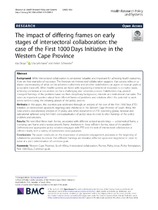The impact of differing frames on early stages of intersectoral collaboration: The case of the first 1000 days initiative in the Western Cape Province

View/
Date
2020Author
Okeyo, Ida L.A.
Lehmann, Uta
Schneider, Helen
Metadata
Show full item recordAbstract
While intersectoral collaboration is considered valuable and important for achieving health outcomes, there are few examples of successes. The literature on intersectoral collaboration suggests that success relies on a shared understanding of what can be achieved collectively and whether stakeholders can agree on mutual goals or acceptable trade-offs. When health systems are faced with negotiating intersectoral responses to complex issues, achieving consensus across sectors can be a challenging and uncertain process. Stakeholders may present divergent framings of the problem based on their disciplinary background, interests and institutional mandates. This raises an important question about how different frames of problems and solutions affect the potential to work across sectors during the initiating phases of the policy process. Methods: In this paper, this question was addressed through an analysis of the case of the First 1000 Days (FTD) Initiative, an intersectoral approach targeting early childhood in the Western Cape Province of South Africa. We conducted a documentary analysis of 34 policy and other documents on FTD (spanning global, national and subnational spheres) using Schmidt's conceptualisation of policy ideas in order to elicit framings of the policy problem and solutions.
